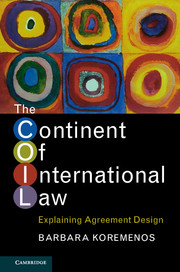Book contents
- Frontmatter
- Dedication
- Contents
- List of figures
- List of tables
- Acknowledgments
- 1 (Re)discovering the continent
- Part I COIL's building blocks: theory and data
- Part II Flexibility provisions in the design of international law
- Part III Centralization, scope, and control provisions in the design of international law
- Appendix 1 List of agreements in COIL sample
- Appendix 2 Coding rules
- Appendix 3 Selection issues in international cooperation data sets
- References
- Index
Appendix 2 - Coding rules
Published online by Cambridge University Press: 05 June 2016
- Frontmatter
- Dedication
- Contents
- List of figures
- List of tables
- Acknowledgments
- 1 (Re)discovering the continent
- Part I COIL's building blocks: theory and data
- Part II Flexibility provisions in the design of international law
- Part III Centralization, scope, and control provisions in the design of international law
- Appendix 1 List of agreements in COIL sample
- Appendix 2 Coding rules
- Appendix 3 Selection issues in international cooperation data sets
- References
- Index
Summary
Below I briefly describe the coding of high or low for the seven cooperation problems not discussed in detail in the text. Recall a coding of low does not imply the cooperation problem is not present; rather, a coding of low simply implies the cooperation problem is not severe enough to meet the threshold for high. I also explain how the actor characteristics were measured. Identification of the various design provisions is detailed in the chapters devoted to them in Parts II and III.
Enforcement problems: For this problem to be coded as high, coders had to establish that free-riding on another's cooperation, that is, choosing to defect while another cooperated, would make at least some subset of states better off than mutual cooperation. Another way of looking at this is asking whether, if one state defects, the other state wants to defect as well or whether it could be just as well off continuing to cooperate. Arms control is typically characterized by an underlying Enforcement problem for at least some subset of states. Coders could easily make the case that limiting some kind of weapon while one's partner cheated was not in a state's interest. This argument is not compelling for women and children's rights. If one's partner starts to defect by eliminating the right to vote for women, it is easy to make the case that the best response for the state left cooperating is to continue to cooperate – that is, to continue to give women the right to vote. In other words, that issue area is not well described by the prisoners’ dilemma game structure. Additionally, a prominent theme in liberal approaches to international law is the idea of the two-level game (Putnam 1988), which highlights the presence of differentiated “state” actors on the international and domestic scenes, and in particular that governments may have incomplete control over domestic agents. For instance, firms affected by environmental agreements or labor standards will have incentives different from those of the government. COIL acknowledges the existence of such two-level problems in its coding of underlying Enforcement problems because sub-state actors whose behavior is governed may have incentives to defect even if the national government does not.
- Type
- Chapter
- Information
- The Continent of International LawExplaining Agreement Design, pp. 371 - 376Publisher: Cambridge University PressPrint publication year: 2016



